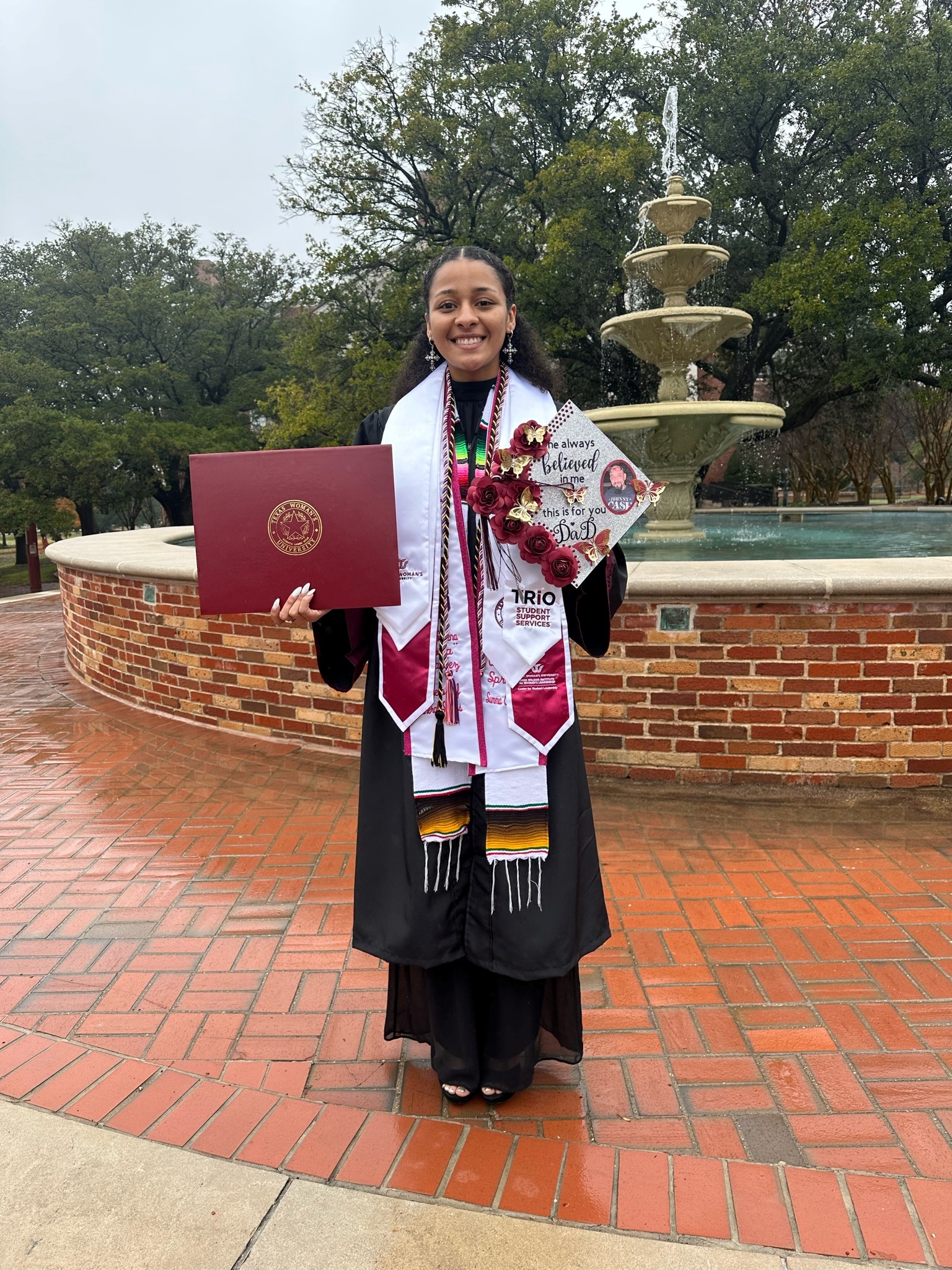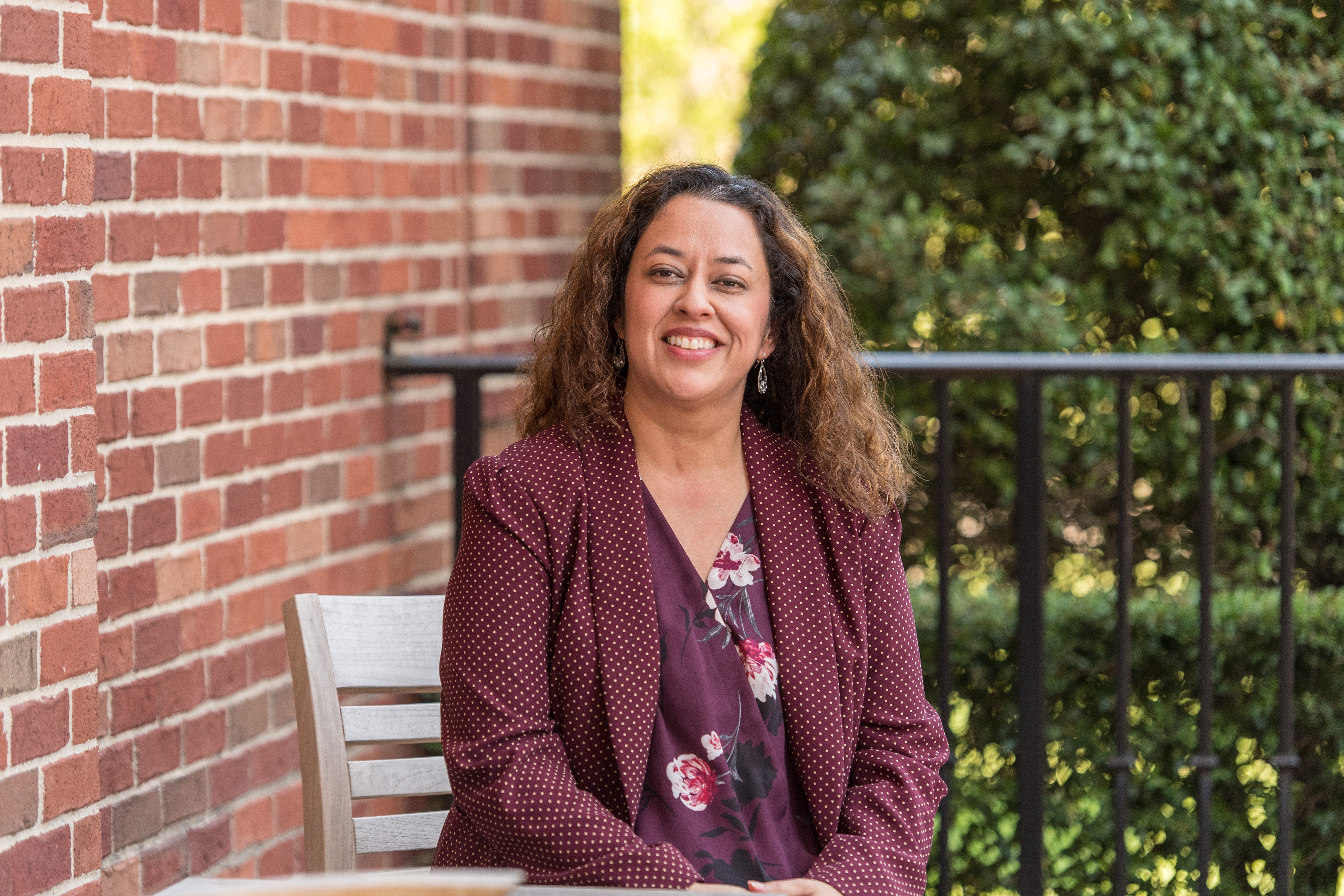Scholarships were a huge incentive for Serena Fernandez to attend Texas Woman’s University, but the community she encountered during her years at the Denton-based institution in North Texas is what truly made her college experience transformational.
Fernandez graduated in 2020 from STEM Early College High School in the mostly Hispanic Harlandale Independent School District in San Antonio. She earned a Presidential Scholarship to Texas Woman’s – a five-hour drive to the north – and gained what she called an exceptional education in a welcoming setting. The scholarship covered the cost of all her tuition and fees, and other scholarships helped cover living expenses.
“Having the opportunity to move to a new city for college and attend college for free because of multiple scholarships, I knew this was the opportunity of a lifetime,” Fernandez said.
But it was the academic and social activities at Texas Woman’s that gave her a collegiate experience she’ll never forget.

“TWU gave me everything I wanted and more,” Fernandez said. “It fostered my growth while I was trying to build community and gave me endless opportunities that contributed to my success thus far.”
She attended numerous campus events, participated in leadership groups, held several campus jobs, joined a sorority, and became an orientation leader. In Fernandez’ words, TWU helped her “blossom.”
She graduated last fall with the highest honors, earning a bachelor’s degree in general studies. She plans on pursuing an MBA.
Like many other first-gen students, it wasn’t surprising that Fernandez found a perfect fit at Texas Woman’s. She particularly appreciated that Texas Woman’s had an ethnically robust student population and that many of her fellow students came from similar backgrounds.
“It gives an immediate sense of belonging and comfort when you’re surrounded by others who share not only the same ethnicity, but also culture and traditions,” Fernandez said. “Finding this at TWU was a key part in making the university feel like it was the one for me.”
And the university isn’t just focused on academic success. TWU has made women’s leadership a hallmark of its educational experience. This helped draw political science professor Christina Bejarano, PhD, a faculty scholar with the Jane Nelson Institute for Women’s Leadership, to Texas Woman’s.
She said the university is building a culture that promotes women’s leadership.
“It’s thinking about skills women have and what valuable skills and perspectives they can provide in our communities to help resolve conflict,” Bejarano said. “When we have more diversity in leadership, the better we can help communities get what they need done.”

TWU is perfectly poised to create more leadership opportunities for individuals who are in underrepresented groups. For the past four years, the university has been ranked by U.S. News & World Report as among the nation’s most ethnically diverse institutions.
In 2023, Texas Woman’s earned the coveted Seal of Excelencia, a national certification that demonstrates a university’s outstanding commitment to advancing Latino student success.
Texas Woman’s is one of only 39 universities across North America that have earned the seal. Collectively, those universities account for less than 1% of all higher education institutions but recently conferred degrees to 17% of all Latino graduates nationwide.
“Earning the Seal of Excelencia affirms our commitment to intentionally aligning outcomes with practices and strategies that lead to not only Latinx student success but to all our graduates thriving professionally and in life more generally,” Texas Woman’s Chancellor Carine Feyten said.
Texas Woman’s student body reflects the state’s changing demographics, marked by a rapidly increasing Hispanic population.
The university’s Hispanic student population doubled to roughly 6,000 students in the 10-year period ending in 2022, with Hispanics accounting for 43% of incoming students for Fall 2022, and 30 percent of the overall student population in that semester.
Many of the Hispanic students who enroll at the university are among the first in their families to ever attend college. A significant number of those students come from Spanish-speaking households, making communications with students and their families particularly important.
With that in mind, the university’s communications efforts have been expanding to include more messaging in Spanish to better serve students from primarily Spanish-speaking households.
In 2020, the university launched a “parents & familia” resources page, written in English and Spanish, because Texas Woman’s recognizes that parents and families have a significant role in helping students navigate their way through college. The resource page includes a thorough overview of safety, programming, orientation and other activities to help students and their families gain a better understanding of the college experience. It is also packed with helpful information to guide them to key resources.
Additionally, the university launched a parent portal that supports Spanish translation through Google Chrome, which gives parents access to important campus news and deadlines, announcements, and personalized newsletters. It also gives parents the option to share updates with other family members and friends.
Texas Woman’s offers Spanish translation as needed for all orientations (first-year and transfer), and the university provides the first-year orientation schedule in Spanish. Beginning in 2023, two sessions in the first-year orientation activities were offered entirely in Spanish. One is titled “Supporting from Afar,” designed to help parents academically support their children. The other session focuses on first-generation students and the challenges they will likely encounter.
The university also developed a Spanish-language webpage for its dual-credit program and its financial aid presentation, delivered to non-English speaking/limited English proficiency parents of high school students. The presentation gives parents the tools needed to support and guide their children. •
About the author
Matt Flores is the assistant vice president for marketing & communication and PIO at Texas Woman’s University.